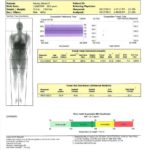The same machines that determine bone density by extremely low-dose radiation (DEXA) can also accurately measure the amount of fat and muscle in your body. This is called a “body composition” study.
If and when you are working hard to improve your eating and lose weight, while also exercising more to gain muscle mass, the body composition study will readily distinguish how much fat or muscle you lost or gained while your scale weight cannot tell you.
Your BMI (body mass index), which is simply calculated from your height and weight, also cannot provide that critical information. Other attempts to measure body fat are much less accurate or reproducible. These include skin caliper measurements as well as various electrical impedance devices. A whole body water immersion device is pretty accurate for total body fat, but as cumbersome (and expensive) as it sounds.
DEXA Body Composition Available
I have been working with the staff of Be Well Body Scan, an imaging offshoot of Beth Israel Deaconess Medical Center, to make body composition studies on their GE Lunar DEXA machine readily available at reasonable prices, highly relevant since this is a self-pay study. The initial scans likely will cost less than $100, and subsequent scans even less. Final pricing should be approved within a few weeks. Their facility is at 25 Boylston Street in Chestnut Hill, where many of you have gotten cardiac calcium score determinations. The DEXA scan itself takes perhaps 10 minutes or so. Radiation is tiny, as it is for a bone scan that most older women get every few years. And you don’t get any more undressed than you do to go through airport security (shoes, belts, things in pockets, etc.).
Some Technical Details
The body composition study can detail your total body fat and total body muscle. It also can display the fat/muscle breakdown by region, such as upper and lower extremities, upper and lower abdomen, and so forth. It captures the estimated weight of the fat or muscle by region, so that you can follow the hoped-for loss of fat and gain of muscle by repeating the scan at reasonable intervals. Think of the possibilites for you for motivation, not just documentation. Be Well provides excellent reports with graphs and tables that display current results and changes from previous scans. Your BMI is also calculated as a related benchmark.
Additionally, the DEXA bone density scan protocol at Be Well, which is usually covered by insurance, also can capture and report the total body composition, although without regional breakdowns. The staff will also provide the FRAX score, an overall estimate of the risk of bone fracture based not only on the measured bone density, but also on other risk factors such as age, smoking, alcohol, prior fractures. Most other imaging facilities that do bone densities do not measure body composition. For this reason, it may be worthwhile to consider having your next bone density at Be Well.
How Fat I Am
Body composition should be viewed as a supportive tool in the care of your body, not as a judgment on your personal self-worth. There is no specific desired standard for body fat percentage. Women naturally have a greater proportion of fat than men. Your doctor just came in at 31.4% fat with a matching BMI of 24 when I weighed 178# at a smidgen under 6 ft tall (shrinking a bit as a grandparent). I know I want to trim down to about 170#, where I used to be (but not in a few years), and get more physically fit through some weight training as well as aerobics. If I persevere, I now would expect a body composition of about 25% fat and better muscle tone, and perhaps longer drives off the tee. I personally think knowing my baseline data will help motivate me and give me a benchmark against which to check myself, perhaps in 6-12 months.


